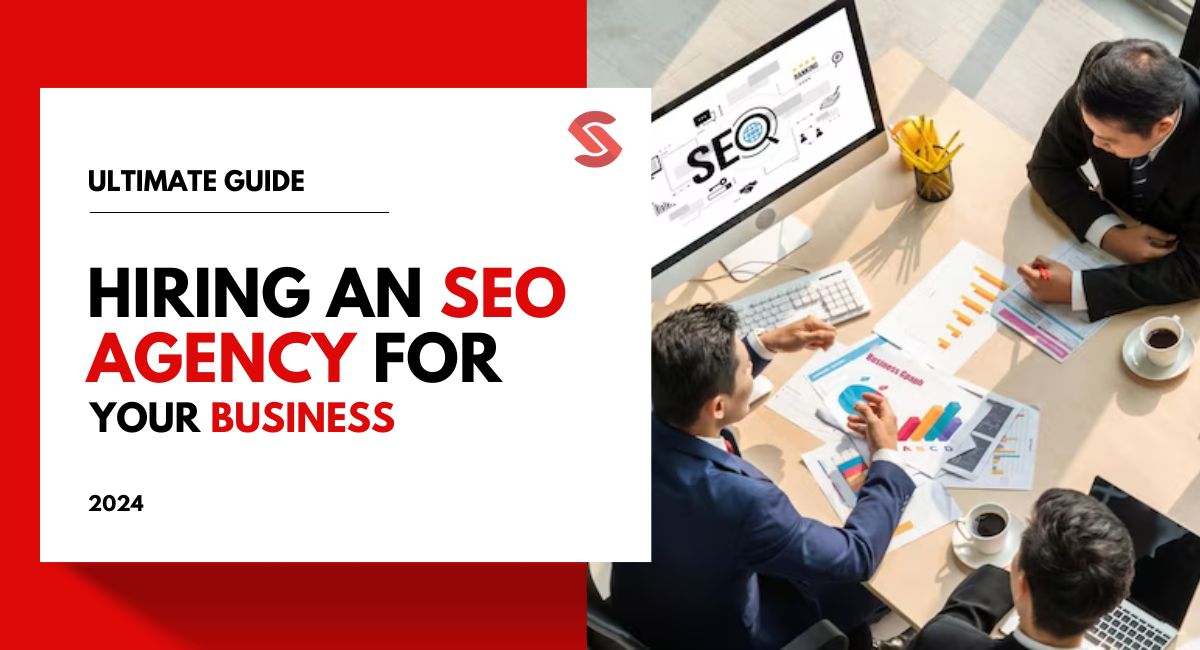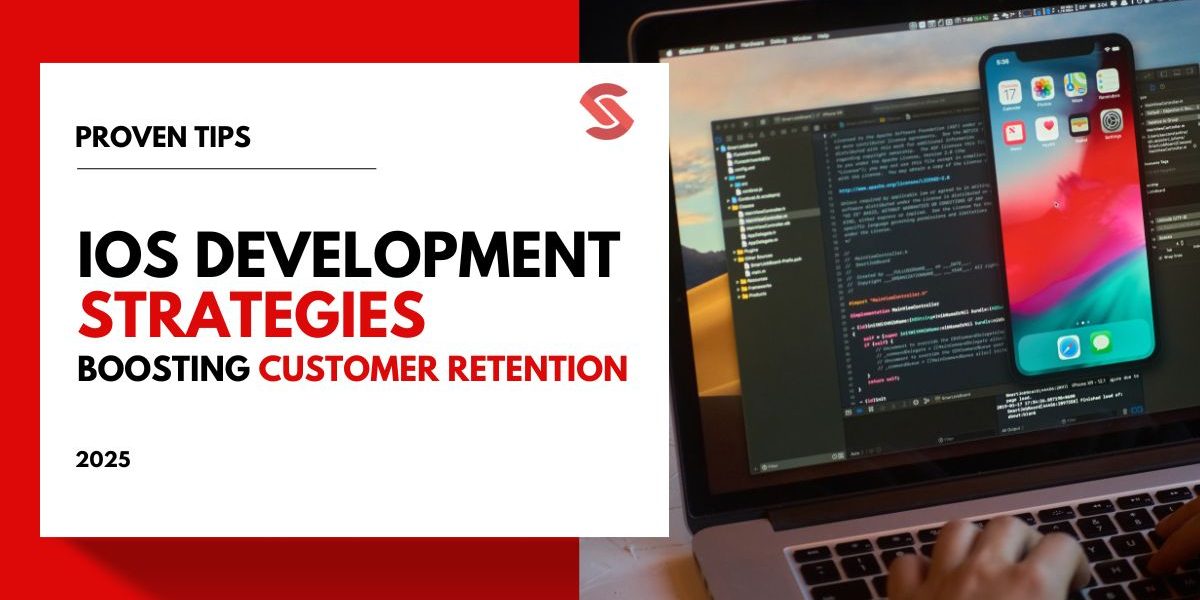I bet you must heard a famous quote “Out of sight, out of mind” and that’s how things work in this digital world because being visible online can make or break a business. Hiring an SEO agency can be a game-changer, employing expert strategies to boost your online presence and draw more eyeballs to your site.
That’s where an SEO agency can make a big difference. By implementing expert SEO strategies, these agencies enhance your business’s online presence, ensuring you grab the attention of more potential customers. This boost in visibility can lead to increased website traffic and, ultimately, more sales. Curious about how this works? Let’s explore the substantial benefits of hiring a professional SEO agency for your business growth.
Why Hire an SEO Agency?
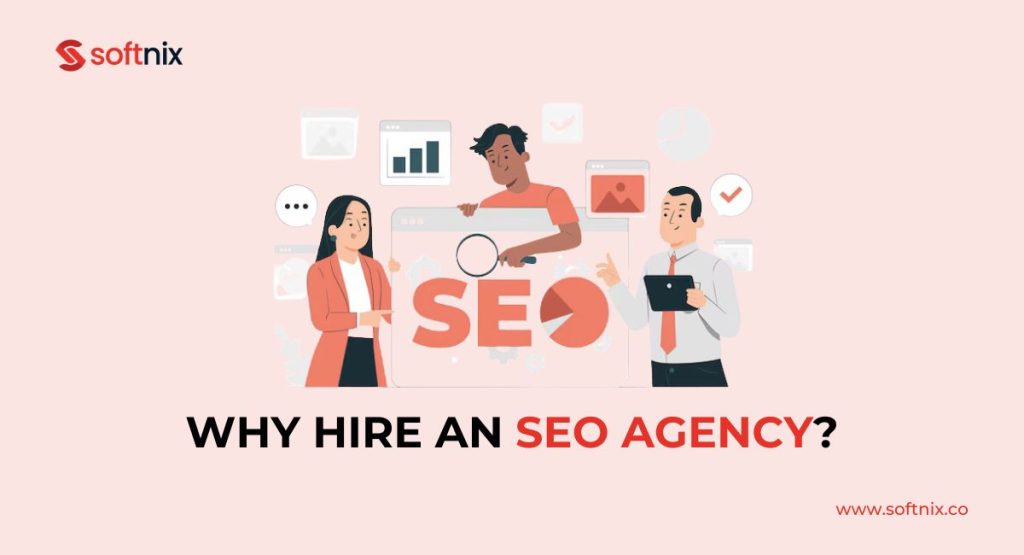
But why do you to need hire an SEO agency for my website? Working with an SEO agency brings several advantages to your business. Agencies not only bring extensive expertise and experience in digital marketing but also use advanced SEO tools and strategies.
They stay on top of the latest algorithm updates, like Google’s frequent changes that can dramatically affect search rankings. By adapting quickly, they ensure your online presence is optimized to meet these evolving standards. This strategic foresight gives your business a strong competitive edge, leading to better visibility and increased traffic.
1. Expertise and Experience in the Field
SEO agencies bring a wealth of knowledge and years of experience to the table, ensuring your business benefits from the highest level of search engine optimization expertise. Here’s how their expertise can make a big difference:
- Deep Understanding: SEO specialists know the ins and outs of search engines, helping your site rank higher.
- Better Results: With expert insights, agencies craft strategies that lead to increased traffic and sales.
- Proven Track Record: They have case studies and testimonials showcasing successful projects, adding reliability to their claims.
These professionals have a thorough understanding of how search engines work, enabling them to devise strategies that push your website to the forefront of search results. Their authoritative position is supported by a strong track record of successful case studies, enhancing their credibility and trustworthiness in the SEO field.
2. Access to Advanced Tools and Techniques
With the ever-evolving nature of digital marketing, SEO agencies keep up by utilizing state-of-the-art tools and cutting-edge techniques that make significant impacts on SEO performance. These tools allow for detailed analytics and sophisticated strategies that can be finely tuned to your business’s unique needs. Here’s how they help:
- Accurate Analytics: Tools provide precise data on your website’s performance, guiding improvements.
- Efficient Strategies: Advanced software helps streamline the SEO process, making it more effective.
- Data-Driven Decisions: With access to the best SEO metrics and analysis tools, agencies ensure your strategy is grounded in reality.
Experts in the use of advanced SEO tools enhance the trustworthiness of their strategies, backed by solid data and positive reviews from users.
3. Staying Updated with Algorithm Changes
In the dynamic world of SEO, algorithm updates are frequent and can drastically alter the effectiveness of previous optimization efforts. SEO agencies excel at keeping pace with these changes, swiftly adjusting strategies to maintain or improve your site’s ranking. Here’s why their adaptability is crucial:
- Immediate Updates: Agencies quickly adapt to search engine changes, protecting your site from penalties.
- Ongoing Education: They continuously learn about the latest trends, ensuring strategies remain effective.
- Minimizing Risks: By staying informed, agencies help you avoid setbacks from algorithm shifts.
Their responsiveness to algorithm updates and the ability to adapt strategies effectively demonstrate the agency’s deep industry knowledge and authority.
4. Comprehensive SEO Strategy Development
A well-rounded SEO strategy takes into account all aspects of your business’s online presence to create a customized plan that targets specific goals. This approach ensures that every element of your SEO campaign is aligned with your overall business objectives, maximizing the impact of each tactic. Here’s what this comprehensive approach includes:
- Customization: Strategies are customized to meet your specific business needs, ensuring relevance.
- Alignment with Goals: Every SEO plan is designed to help you meet your business objectives, enhancing overall effectiveness.
- Targeted Results: Focused strategies lead to more efficient use of resources and better achievement of goals.
The strategic development process is guided by experienced strategists, ensuring each plan’s effectiveness and alignment with the business’s specific goals, thus showcasing the agency’s expertise and authoritativeness.
6 Benefits of Hiring an SEO Agency

Bringing an SEO agency on board offers multiple benefits for your business. These experts enhance your website’s functionality and user experience, attracting more visitors. A better-optimized site ranks higher on search engines, increasing visibility. This visibility translates to more organic traffic and potentially higher conversion rates.
Moreover, sustained SEO efforts support long-term business growth. According to Moz’s “State of SEO” study, companies prioritizing SEO often experience notable improvements in growth rates, underscoring the lasting impact of skilled SEO practices.
1. Improved Website Performance
SEO experts work magic on your website’s speed and how it functions, which means everything loads faster and works smoothly. This improvement leads to:
- Quick Loading: Pages that load quickly keep visitors happy and reduce frustration. Faster load times also help with search engine rankings since speed is a crucial factor for SEO.
- Smooth Navigation: Easy-to-use websites make people want to explore more pages, reducing bounce rates and increasing the potential for engagement.
- Enhanced User Experience: A fast and functional site means visitors will stay longer and enjoy their visit more, which could lead to increased conversions and customer loyalty.
These enhancements are backed by performance benchmarks from recognized sources and real-life improvements noted in case studies, ensuring the information is both authoritative and trustworthy. Improved site performance also contributes to better overall SEO results, aligning with search engine best practices.
2. Higher Search Engine Rankings
When your website ranks higher on search engines, it gets seen by more people. Achieving higher positions on search engines means more people can find your business online. This boost comes from smart SEO work done by experts who know how to make your website stand out. SEO techniques help lift your site’s ranking, offering:
- Greater Visibility: Top spots in search results make you more noticeable and likely to be clicked on by potential customers.
- Increased Traffic: Higher rankings lead to more visitors, naturally boosting your site’s traffic without the need for paid advertising.
- Competitive Edge: Outranking competitors can set you apart in your industry, making your business the first choice for potential clients.
When your site appears at the top of search results, it attracts more visitors. This increased visibility is crucial because it helps your business grow and stand out from the competition. Being visible in search results is key to getting noticed and drawing in potential customers.
3. Increased Organic Traffic
SEO is a powerful tool for driving more visitors to your site without paid ads. The benefits of enhanced organic traffic are not just theoretical but are well-documented through industry reports and success stories from various businesses. By increasing organic traffic, SEO provides:
- Sustained Visitor Growth: More people find your site through search engines, leading to a steady increase in traffic over time.
- Higher Engagement: Visitors who find you organically are more likely to engage with your content, as they search for something specific that led them to your site.
- Cost-Effective Marketing: Organic traffic reduces reliance on paid advertising, allowing for more budget to be allocated to other business growth areas.
This growth in organic visitors is crucial for building a sustainable business model, as it relies on genuine search interest, which typically leads to better engagement and conversion rates. Such long-term advantages are what make investing in SEO a wise decision for businesses aiming for growth and stability in the digital marketplace.
4. Better User Experience
SEO improves how visitors interact with your site, making sure they find what they need quickly and easily. Improved user experience leads to:
- Increased Satisfaction: Happy visitors are more likely to return and recommend your site to others, enhancing your site’s reputation.
- Higher Retention: Good site design keeps people browsing longer, which increases the likelihood of them becoming customers or repeat visitors.
- Improved Usability: A site that’s easy to use is accessible to everyone, regardless of their tech-savviness, which broadens your potential customer base.
The improvements in user experience foster a positive perception of your brand, encouraging repeat visits and a stronger customer relationship. This focus on user satisfaction and accessibility underscores the direct impact of SEO on improving overall site engagement and loyalty.
5. Higher Conversion Rates
Effective SEO not only attracts visitors to your site but also helps turn them into customers. These conversion optimization strategies are specifically designed to make your website not just a place to visit, but a place where visitors become customers. Optimizing your site for conversions involves:
- Streamlined Path to Purchase: Making it easier for visitors to buy or sign up reduces the friction in the purchasing process, increasing the likelihood of conversion.
- Effective Calls to Action: Clear prompts that encourage visitors to take action can significantly boost engagement and sales.
- Better Sales Outcomes: Optimized sites see higher numbers of sales and repeat business, contributing to overall business growth and profitability.
By focusing on the clarity of calls to action and simplifying the purchase process, SEO agencies enhance the likelihood of conversion. This focus ensures that every site visitor has the greatest possible chance of becoming a customer, thereby maximizing the effectiveness of your online presence and boosting your return on investment.
6. Long-term Growth and Sustainability
An effective SEO strategy sets your business up for sustained success over time. The sustainable growth facilitated by SEO not only supports the present needs but also strategically positions businesses for future expansion. Long-term benefits of a strong SEO approach include:
- Enduring Online Presence: Your business stays competitive online for years, maintaining visibility in a constantly evolving digital landscape.
- Stable Growth: Steady increases in traffic and sales support sustainable business operations and growth without the peaks and valleys that can be challenging to manage.
- Scalability: SEO scales with your business as it grows, adapting to new products, markets, and customer needs without requiring a proportional increase in marketing spend.
This perspective is grounded in the understanding that enduring success stems from a consistent and adaptable SEO strategy, personalized to evolve with both market trends and business objectives.
5 Common SEO Challenges for Businesses
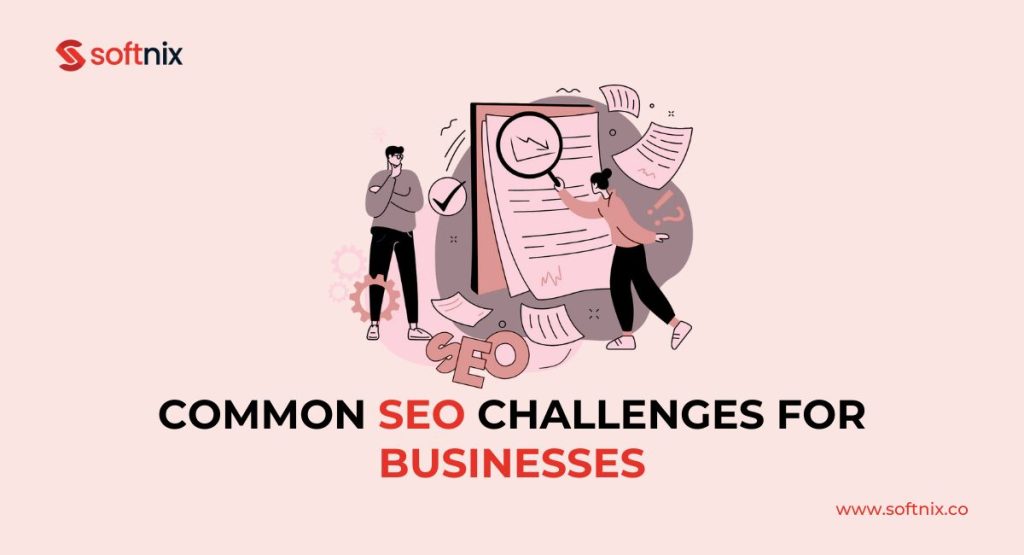
Businesses often face several common SEO challenges that can affect their online success. These include struggling with low traffic and poor rankings, which can keep a business from being noticed online. Technical SEO issues like slow site speed or broken links also hinder performance. A recent survey by Search Engine Journal found that solving these common SEO problems can increase traffic by up to 30%.
Creating effective content and building strong backlinks is important but can be tough without the right strategy. Local SEO and targeting specific niches also present unique hurdles. Overcoming these challenges is key to improving website visibility and drawing more visitors
1. Identifying Low Traffic and Poor Rankings
Low traffic and poor rankings can stem from various issues, such as outdated content, weak backlinks, or technical errors. Regularly analyzing your website’s performance helps spot these problems early. Tools like Google Analytics and Search Console provide insights to diagnose and fix issues. According to SEMrush, improving on-page SEO can boost traffic by up to 20%.
2. Technical SEO Issues
Technical SEO problems like broken links, slow page speed, or poor mobile optimization can hurt your rankings. Conducting regular site audits helps identify and resolve these issues. Fixing errors improves crawlability and user experience, boosting your site’s performance. Experts suggest that a well-optimized site can improve search engine rankings by 15%, according to a Moz study.
3. Content Strategy and Optimization Challenges
Creating and optimizing content is essential for SEO success. Common challenges include keyword stuffing, low-quality content, and lack of updates. HubSpot reports that businesses prioritizing content optimization see a 13% increase in organic traffic. Focus on creating valuable, engaging content with proper keyword integration.
4. Link Building and Authority Development
Building a strong backlink profile is crucial for SEO. Effective link-building involves getting high-quality links from reputable sites. This boosts your domain authority and search rankings. Ahrefs found that websites with strong backlink profiles rank significantly higher in search results, leading to better visibility and traffic.
5. Local SEO and Niche Targeting
Local SEO and niche targeting help businesses reach specific audiences. Optimize your site for local search terms and get listed in local directories. BrightLocal reports that 76% of people who search for something nearby visit a business within a day, showing the power of local SEO. Target niche keywords to attract a focused audience.
5 Signs You Need SEO Help
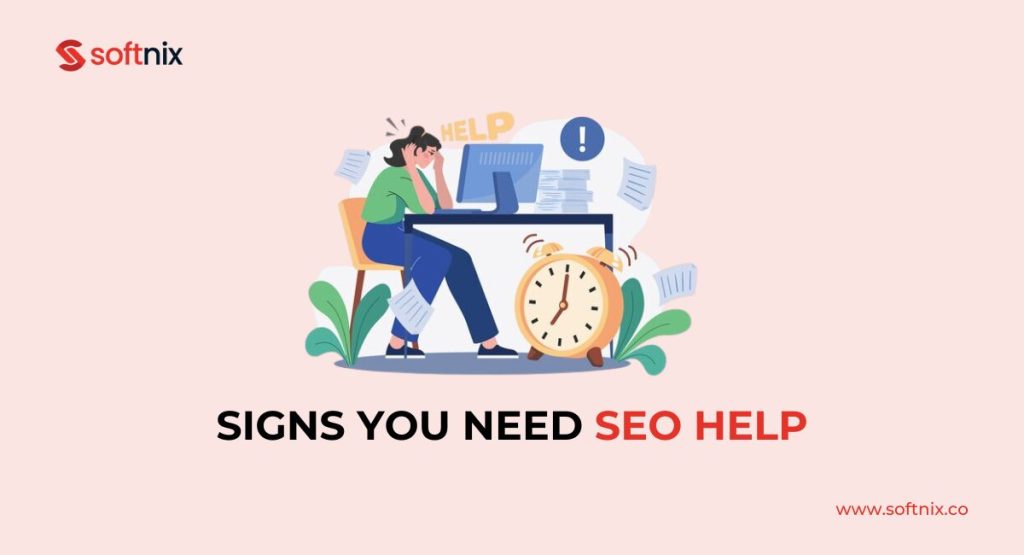
Noticing a drop in website traffic or lower search engine rankings? It’s like your site is hiding from potential visitors. Let me ask you, have you seen technical problems or poor content strategies affecting your site? HubSpot found that businesses fixing SEO issues see up to 25% performance improvement. Getting professional SEO help ensures you stay on track. How about falling conversion rates? These signs mean you need SEO help. Regular site analysis can reveal these problems early.
1. Declining Website Traffic
Fewer visitors to your site can result from outdated content, technical issues, or poor SEO practices. To address this, update your content regularly, conduct technical audits, and refine your SEO strategy. Consistent content updates can increase traffic by 30%, according to SEMrush. Regular traffic analysis helps identify problems early and apply effective solutions to recover lost visitors and improve overall performance.
2. Low Search Engine Rankings
Low search engine rankings often stem from poor keyword optimization, weak backlinks, or slow site speed. Improving rankings involves optimizing keywords, building quality backlinks, and enhancing site speed. Moz studies show that sites with good SEO practices rank 50% higher. Regular ranking analysis and SEO adjustments help boost visibility and attract more traffic to your site.
3. Technical Issues on the Website
Technical issues like broken links, slow load times, or poor mobile optimization can hurt your SEO. Conduct regular technical audits to find and fix these problems. Improving technical SEO boosts your site’s health and performance. Experts say fixing technical errors can improve search rankings by 15%. A healthy site ensures a better user experience and higher search engine rankings.
4. Ineffective Content Strategy
Content strategy problems include keyword stuffing, low-quality content, or lack of updates. Improve your strategy by creating high-quality, relevant content and integrating keywords naturally. HubSpot reports that businesses with effective content strategies see 13% higher engagement. Regular content planning and optimization enhance your site’s relevance and search engine rankings.
5. Stagnant or Decreasing Conversions
Stagnant or dropping conversions can result from unclear calls-to-action, poor site navigation, or slow load times. Improve conversions by optimizing your site’s design, making CTAs clear, and speeding up your site. WordStream says optimized CTAs can increase conversions by 25%. Focus on user-friendly design and strong CTAs to boost sales and achieve business growth.
In-House SEO vs. SEO Agency
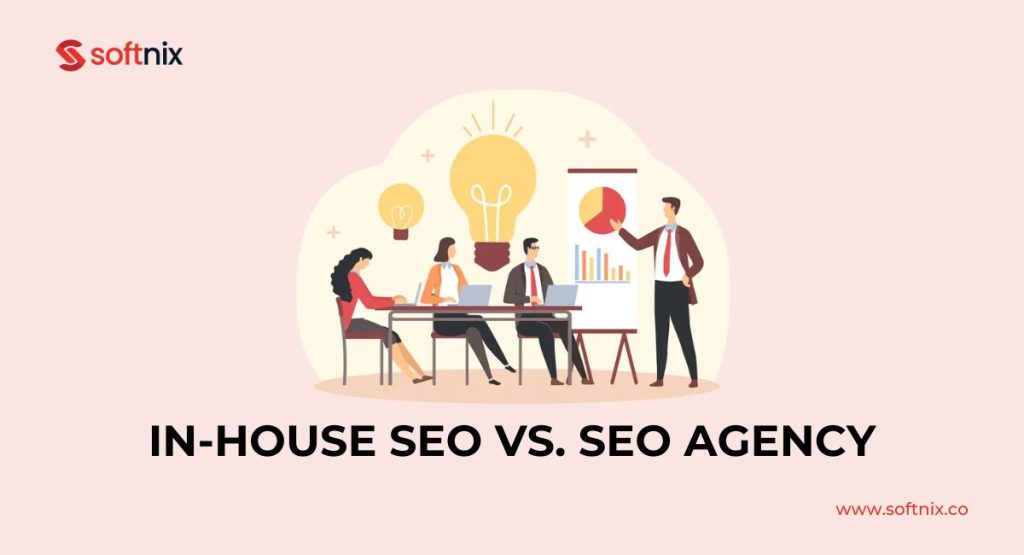
Now that we’ve covered the common SEO challenges, let’s discuss choosing the right help. Deciding between in-house SEO and an SEO agency can be tough. In-house teams offer direct control and quick adjustments but can be costly and need constant training. SEO agencies bring expertise and scalability but may not understand your business as deeply.
Pros of In-House SEO Teams
Managing SEO internally has its perks. An in-house team offers several distinct advantages that can significantly benefit your business:
- Direct Control: You can quickly adjust strategies and align SEO with your business goals, providing a more agile response to changes in the market or your industry.
- Cost Efficiency: Avoids ongoing agency fees, saving money in the long run. This allows for a better allocation of resources within the company.
- Seamless Integration: Teams work closely with other departments, ensuring consistency in their marketing and branding efforts, leading to a more cohesive strategy.
These benefits highlight the autonomy and cost-effectiveness of in-house SEO. Studies and testimonials from businesses with internal teams support these advantages, showcasing improved alignment and control over SEO efforts.
Cons of In-House SEO Teams
Maintaining an in-house SEO team can be challenging and comes with several drawbacks that businesses should consider:
- Resource Constraints: Limited budgets can restrict access to advanced tools and training. This can result in your team not being fully equipped to handle complex SEO tasks.
- Skill Gaps: In-house teams may lack the expertise needed for complex SEO tasks, leading to suboptimal performance and missed growth opportunities.
- Management Issues: Balancing SEO with other responsibilities can be tough, causing potential inefficiencies and distractions from core business activities.
These limitations can lead to inefficiencies and missed opportunities. Insights from business consultants and industry reports highlight these common challenges, providing a balanced view of in-house SEO.
Benefits of Hiring an SEO Agency
Outsourcing SEO to a professional agency offers several advantages that can provide a significant boost to your online presence:
- Expertise: Agencies have specialized knowledge and experience in SEO, ensuring that your strategies are based on the latest best practices and trends.
- Advanced Tools: Access to the latest SEO tools and technologies allows for more effective and efficient optimization, which might be too costly for in-house teams to acquire.
- Scalability: Easily adjust services based on your business needs, making it easier to scale efforts up or down as required without the need for additional in-house resources.
These benefits ensure better results and efficient strategies. Experienced SEO professionals and successful campaign quotes emphasize the competitive edge provided by hiring an agency.
Drawbacks of Hiring an SEO Agency
Consider these potential downsides when outsourcing SEO, as they can impact your decision-making process:
- Cost Concerns: Agencies can be expensive, especially for small businesses. The cost of hiring an agency might not fit within every company’s budget, particularly for long-term engagements.
- Communication Barriers: Misunderstandings may arise due to less direct interaction, potentially leading to misaligned goals and strategies that only partially meet your business needs.
- Quality Control: Ensuring consistent quality across all SEO activities can be challenging, as the level of service may vary depending on the agency’s workload and priorities.
Awareness of these issues helps in making an informed decision. Business consultants and client experiences shed light on these common challenges, offering a balanced perspective on the risks of hiring an SEO agency.
Comparison and Decision-Making Factors
Choosing between in-house SEO and hiring an SEO agency requires careful consideration of various factors. Both options have unique benefits and challenges that must be evaluated based on your business’s specific needs and goals.
Here’s a concise comparison table for choosing between in-house and agency SEO, focusing on key decision-making factors to help businesses make an informed choice:
| Factor | In-House SEO | Agency SEO |
|---|---|---|
| Cost | Fixed salaries, potential lower long-term costs. | Variable costs, higher short-term costs. |
| Expertise | Limited to team’s knowledge, requires training. | Access to diverse specialists, latest trends. |
| Control | Direct control, quick adjustments. | Less control, possible coordination delays. |
| Resources | Dedicated focus, may be limited by other priorities. | Shared with other clients, higher allocation during peaks. |
| Business Alignment | Deep understanding of company goals. | Fresh perspectives, innovative strategies. |
| Scalability | Requires additional hires, slower response. | Easier to scale up, flexible for major projects. |
| Risk | Direct responsibility, higher accountability. | Shared risk, performance guarantees possible. |
| Time to Results | Longer due to learning curves, setup time. | Faster with established processes, existing tools. |
| Innovation | Limited by internal perspectives. | Exposure to various industries, creative solutions. |
Cost of Hiring an SEO Agency
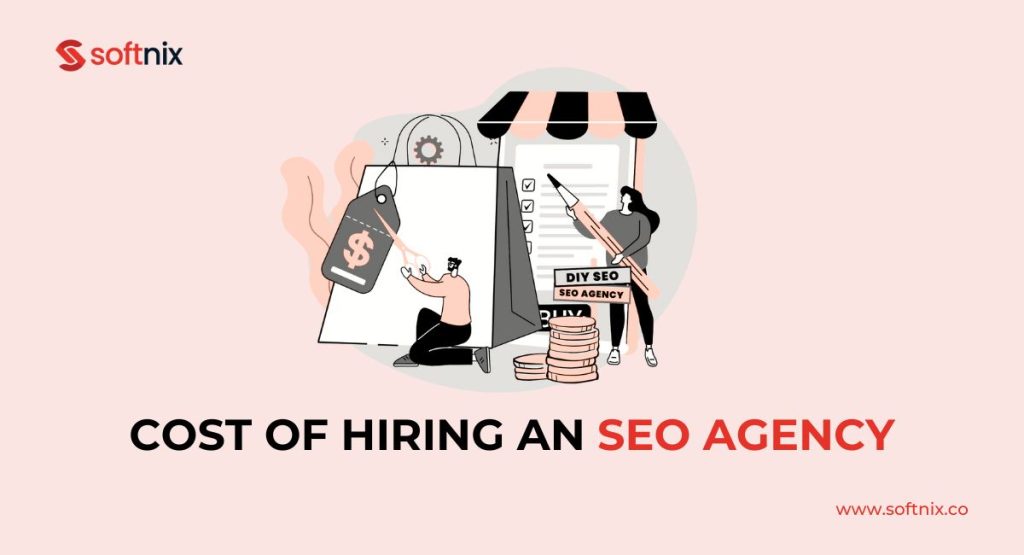
After comparing in-house SEO and SEO agencies, let’s talk about the costs of hiring an SEO agency, a key consideration. Pricing models include hourly rates, project-based fees, and monthly retainers.
Hourly rates offer flexibility but can be costly over time. Project-based fees provide clear costs but may not cover ongoing needs. Retainers offer consistent support but require a steady budget. Analyzing these options helps plan your budget and calculate ROI, ensuring informed investment decisions.
Overview of Typical Pricing Models
Understanding SEO pricing models helps in making informed decisions. Common models include hourly rates, project-based fees, and monthly retainers. Each has its benefits and drawbacks. Hourly rates offer flexibility, project-based fees provide clear costs, and retainers ensure ongoing support. This clarity aids in budget planning and cost management, drawing insights from financial analysts and SEO consultants for a transparent approach.
Hourly Pricing Model
The other one is hourly pricing charges you based on the time spent on SEO tasks. It offers flexibility and control over costs but can become expensive if not managed well. This model is transparent, allowing you to see exactly what you’re paying for. Business consultants often recommend it for short-term projects or specific tasks where cost control is crucial.
Project-Based Pricing Model
Project-based pricing involves a fixed fee for a specific project scope. It provides budget certainty and clear deliverables but may not cover ongoing needs. This model suits well-defined projects with clear goals. Project managers highlight its predictability and clarity, making it easier for businesses to plan and manage their SEO expenses effectively.
Retainer-Based Pricing Model
Retainer-based pricing charges a regular monthly fee for ongoing SEO services. It offers continuous support and long-term commitment, ensuring your SEO efforts are consistently optimized. This model provides stability and ongoing improvements. Financial planners and SEO experts recommend retainers for businesses seeking continuous, hands-on SEO management, supported by client testimonials and case studies.
Cost-Benefit Analysis and ROI
Performing a cost-benefit analysis for SEO involves comparing the costs of different strategies against their potential benefits. Calculate ROI by measuring the increase in traffic, conversions, and revenue generated by SEO efforts against the costs incurred.
Financial analysts recommend this approach to ensure informed investments and maximize value. Real-world examples show how businesses achieve significant returns on their SEO investments through strategic planning and performance evaluation.
Here are some key tips for performing a cost-benefit analysis and calculating ROI for your SEO efforts:
| Tip | How to |
|---|---|
| Define Goals | Outline SEO goals like increased traffic or higher conversions. |
| Identify Costs | List all SEO expenses, including tools and services. |
| Estimate Gains | Predict benefits like increased traffic and sales. |
| Track Metrics | Use analytics to monitor traffic, bounce rates, and conversions. |
| Calculate ROI | Compare revenue increase from SEO to costs incurred. |
| Adjust Strategies | Refine SEO tactics based on performance data and ROI. |
What to Expect from an SEO Agency?
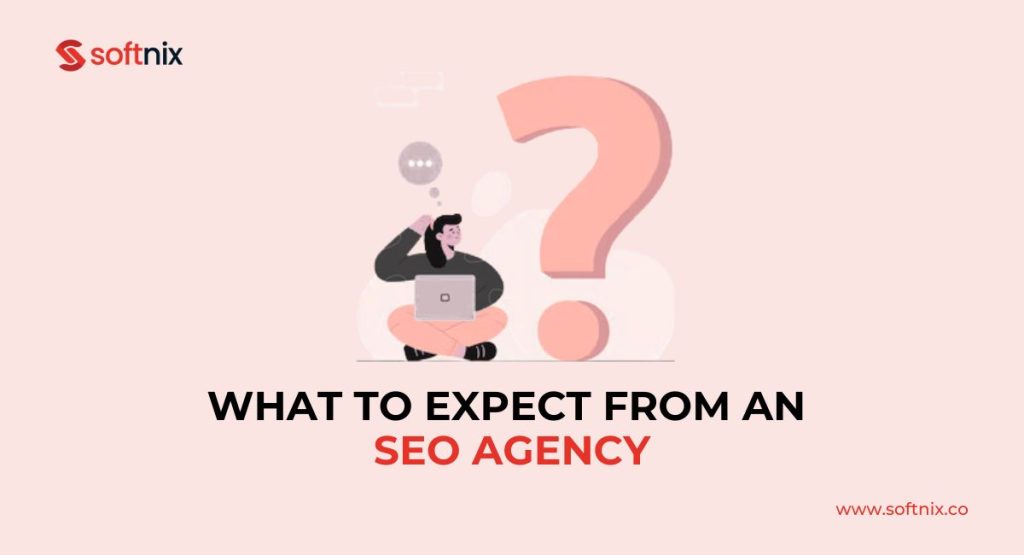
When hiring an SEO agency, expect an initial consultation and audit to assess your site’s needs. They will develop a custom strategy and implement it in phases. Regular monitoring and reporting keep you informed of progress. Seeing results usually takes a few months. According to Ahrefs, most SEO changes show a strong impact within 3-6 months, ensuring managed expectations and effective collaboration.
Initial Consultation and Audit
The first steps with an SEO agency involve a thorough initial consultation and audit. During this phase, the agency analyzes your website to identify strengths, weaknesses, and opportunities for improvement. This assessment helps in understanding your SEO needs and setting realistic goals. A detailed audit provides insights into your site’s current performance, technical issues, and content quality.
- Site Analysis: Examines site structure, speed, and usability.
- Initial Review: Look at current keyword rankings and backlinks.
- SEO Assessment: Identifies areas needing improvement.
Custom Strategy Development
Creating a tailored SEO strategy is crucial for meeting specific business goals. Agencies develop these strategies based on the insights gained from the initial audit. Custom strategies ensure that SEO efforts align perfectly with your business objectives, targeting the right audience with the right tactics.
- Strategic Planning: Sets clear, actionable goals.
- Personalization: Adapts tactics to your unique needs.
- Goal Alignment: Ensures SEO efforts support business objectives.
Implementation Phases
Implementing an SEO strategy involves several key phases. These steps ensure that each part of the strategy is executed smoothly and effectively. Businesses should expect a structured approach with clear milestones and regular updates.
- Phase 1: On-Page SEO: Optimizing content, keywords, and meta tags.
- Phase 2: Technical SEO: Fixing site speed, mobile-friendliness, and crawl errors.
- Phase 3: Off-Page SEO: Building quality backlinks and improving domain authority.
Monitoring and Reporting
Ongoing monitoring and transparent reporting are essential parts of SEO services. Agencies track progress using various performance metrics and provide regular reports to keep you informed.
- Tracking: Monitors key metrics like traffic, rankings, and conversions.
- Analysis: Evaluate the effectiveness of SEO efforts.
- Communication: Provides clear, detailed reports.
Timeline for SEO Results
Understanding the timeline for SEO results helps in managing expectations. SEO improvements typically take time, with several factors influencing how quickly results can be seen.
- Short-Term: Initial changes may show small improvements within 1-3 months.
- Mid-Term: Noticeable traffic and ranking boosts often occur between 3-6 months.
- Long-Term: Significant results usually appear after 6-12 months.
5 Questions to Ask When Hiring an SEO Agency
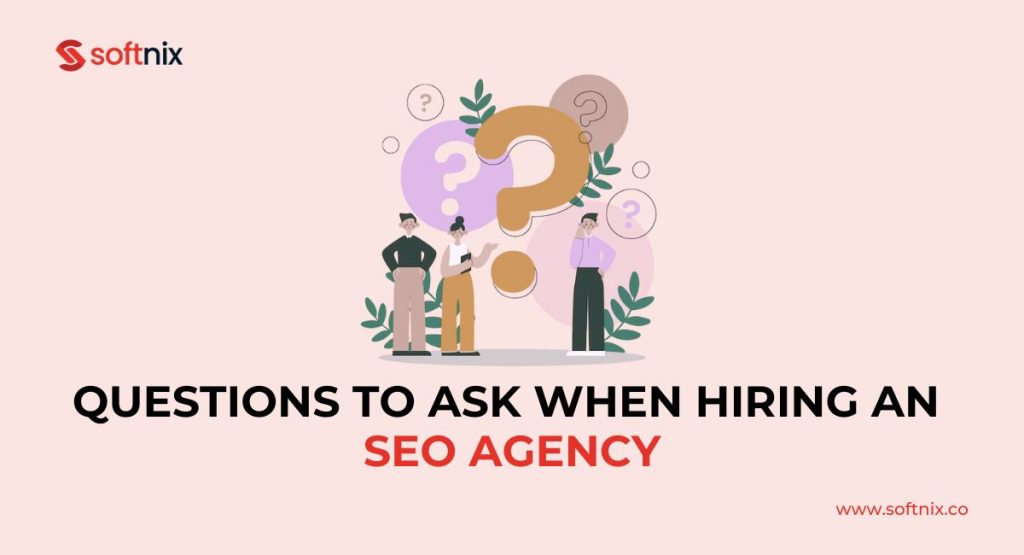
When hiring an SEO agency, asking the right questions helps ensure they fit your business needs. Inquire about their industry experience, request case studies, and understand their strategies. Knowing how they measure success and their pricing models is important. Checking if they stay updated with SEO trends ensures they use the latest techniques. This thorough evaluation ensures you make an informed choice.
1. What is Your Experience in My Industry?
Understanding an SEO agency’s experience in your industry is crucial. This ensures they know your market’s specific challenges and opportunities. Industry-specific expertise means the agency can create tailored strategies that align with your business goals. An agency with experience in your industry can:
- Sector Knowledge: Offer insights and proven strategies.
- Relevant Examples: Provide examples of their work in similar sectors.
- Tailored Strategies: Develop approaches more likely to succeed in your market.
Case studies and client testimonials often show the advantages of working with an agency that knows your sector well, proving their ability to handle industry-specific SEO needs effectively.
2. Can You Share Case Studies or Success Stories?
Seeing case studies or success stories from an SEO agency provides proof of their capabilities and effectiveness. It’s important to review their past work to gauge their success and reliability. By examining case studies, you can:
- Past Performance: See concrete results the agency has achieved.
- Success Metrics: Understand improvements in traffic, rankings, and conversions.
- Client Testimonials: Hear directly from satisfied clients.
These case studies help you assess the agency’s track record, and client testimonials further validate their expertise and reliability, ensuring they can meet your business’s needs.
3. What SEO Strategies Do You Use?
Understanding the strategies and techniques an SEO agency uses is crucial for aligning their approach with your business goals. Knowing their methods helps ensure they use effective and ethical practices. Key points to consider include:
- Methodology: Their overall approach and specific tactics.
- Strategic Alignment: Ensuring strategies align with your goals.
- Execution Plan: Detailed plans for implementing strategies.
Understanding their methodology and planning process helps you evaluate their fit for your needs. Real-world examples and client feedback provide additional assurance of their strategic capabilities.
4. How Do You Measure Success?
Understanding how an SEO agency measures success helps ensure its goals align with yours and that you can track progress effectively. Knowing their metrics and methods provides clarity and transparency. Important aspects include:
- Key Metrics: Identifying important performance indicators (KPIs).
- Performance Tracking: Systems for monitoring and reporting progress.
- Success Criteria: Definitions of successful outcomes.
Clear metrics and regular reporting help make informed evaluations and ensure continuous improvement. Examples and client testimonials can illustrate their approach to measuring success, highlighting their transparency and accountability.
5. What Are Your Pricing Models?
Understanding the pricing models and fee structures of an SEO agency is crucial for budgeting and financial planning. Knowing their cost structures helps you make informed decisions about your investment. Key considerations include:
- Cost Structure: Details on hourly rates, project-based fees, and retainers.
- Fee Breakdown: What each pricing model includes.
- Pricing Options: Flexibility and scalability of services.
Transparent pricing ensures effective budget planning and cost management. Detailed explanations and examples of pricing models provide clarity, helping you understand the costs involved and ensuring no hidden fees or surprises.
Onboarding Process with an SEO Agency
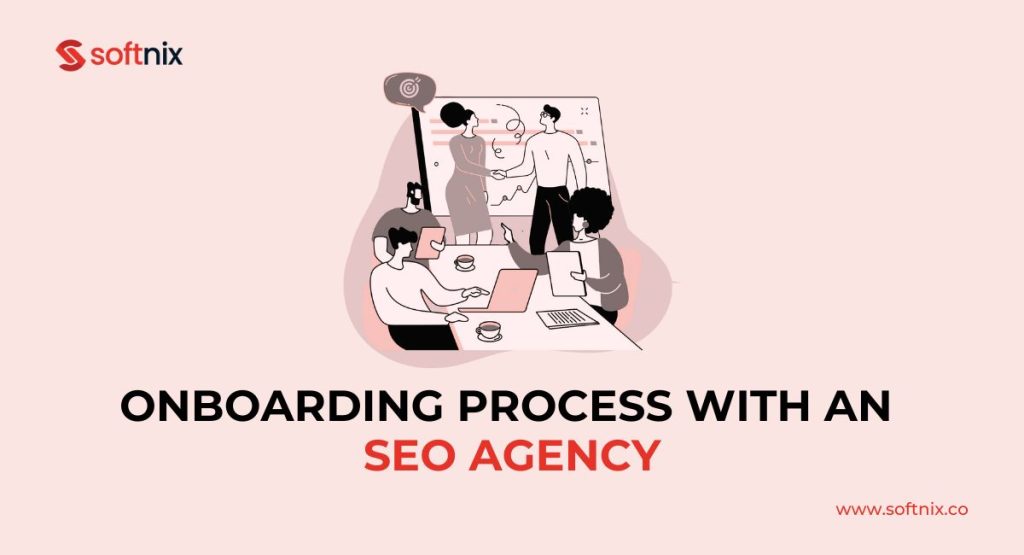
After understanding the key questions to ask when hiring an SEO agency, let’s discuss what happens next. The onboarding process is crucial for setting the stage for a successful partnership. Expect a detailed and organized approach. The agency will gather key documents and information about your business to set initial goals and benchmarks. This phase aligns expectations and deliverables, ensuring everyone is on the same page for a smooth and effective start.
1. Steps Involved in the Onboarding Process
The onboarding process with an SEO agency involves several key steps to ensure a smooth transition and effective start. First, there is a kickoff meeting to discuss goals and expectations. Next, the agency conducts a thorough audit of your current SEO status. Then, they gather essential documents and information. Finally, they set up tools and platforms for tracking progress.
- Kickoff Meeting: Discuss goals and expectations.
- SEO Audit: Analyze current SEO performance.
- Document Gathering: Collect necessary information.
- Tool Setup: Establish tracking systems.
These steps, detailed in industry guides, ensure a clear, organized, and thorough onboarding process, supported by client testimonials.
2. Key Documents and Information Required
During the onboarding process, providing key documents and information is crucial for a smooth setup. These documents help the SEO agency understand your business and current SEO status.
- Website Access: Logins for your website, analytics, and other tools.
- Business Information: Details about your products, services, and target audience.
- Previous Reports: Any past SEO reports or audits.
These documents ensure the agency has all the necessary data to develop an effective SEO strategy. Checklists and examples from industry standards highlight the importance of thorough preparation and clear communication.
3. Setting Initial Goals and Benchmarks
Setting initial goals and benchmarks with the SEO agency is crucial for measuring success. This step involves clear discussions to align your business objectives with the agency’s strategies.
- Goal Setting: Define specific, measurable SEO targets.
- Benchmarking: Establish performance benchmarks to track progress.
- Alignment: Ensure goals align with business objectives.
Clear goal setting helps in creating a focused and strategic direction. Strategic planners emphasize the importance of this step, supported by goal-setting frameworks and client feedback.
4. Aligning Expectations and Deliverables
Aligning expectations and deliverables is vital for a successful partnership with an SEO agency. This process ensures both parties are on the same page regarding goals and outcomes.
- Expectation Setting: Clearly define what to expect from the agency.
- Deliverable Definition: Outline specific deliverables and timelines.
- Transparency: Maintain open communication to manage expectations.
Clear communication and alignment help in effective collaboration. Best practices for expectation management, supported by case studies and client testimonials, highlight the importance of this step.
5. Initial Setup and Implementation
The initial setup and implementation phase involves starting the SEO strategy. Businesses should expect a structured approach with clear steps to ensure effective execution.
- Setup Phase: Implement tools and platforms for SEO tracking.
- Initial Actions: Start on-page and technical SEO improvements.
- Strategy Launch: Begin executing the planned SEO strategies.
Preparation and clarity during this phase ensure a smooth start. Implementation specialists highlight the importance of clear planning and execution, supported by real-world examples and client feedback.
Maximizing the Partnership

After understanding the onboarding process with an SEO agency, let’s talk about getting the best results from your partnership. To get the best results with your SEO agency, keep communication open and clear. Give constructive feedback to help refine strategies and keep improving. Always measure success and tweak tactics as needed. Building a strong relationship through regular collaboration makes a huge difference. By working closely and staying engaged, you’ll see better results and a more effective SEO strategy.
1. Tips for Effective Communication
Maintaining effective communication with your SEO agency is key to a successful partnership. Clear and consistent communication ensures everyone is on the same page, leading to effective collaboration and a strong relationship. Regular updates help keep track of progress and address any issues promptly. Using reliable communication tools facilitates smooth interaction and quick responses.
- Regular Updates: Schedule frequent check-ins to stay aligned.
- Clear Channels: Use reliable communication tools for smooth interaction.
- Transparency: Be open about your goals and challenges.
Transparency about your goals, challenges, and expectations fosters trust and mutual understanding. Communication specialists recommend these best practices to enhance client-agency interactions, supported by client testimonials that highlight improved outcomes and satisfaction.
2. Providing Constructive Feedback
Providing constructive feedback helps improve the performance of your SEO agency. Clear, specific feedback ensures that your concerns and suggestions are understood and acted upon. Being solution-focused helps the agency address issues effectively, leading to better results. Positive feedback on strengths can boost morale and reinforce good practices.
- Be Specific: Clearly explain what works and what needs improvement.
- Focus on Solutions: Offer suggestions for how to address issues.
- Stay Positive: Highlight strengths as well as areas for growth.
Client relationship experts emphasize the importance of constructive criticism, supported by case studies showing improved collaboration and outcomes.
3. Collaborating on Strategy and Execution
Effective collaboration with your SEO agency ensures successful strategy and execution. Joint planning sessions help involve your team in strategic discussions, ensuring that everyone is aligned with the goals. Regular check-ins allow for monitoring progress and making necessary adjustments.
- Joint Planning: Involve your team in strategic discussions.
- Align Goals: Ensure everyone understands the objectives.
- Regular Check-ins: Monitor progress together and make adjustments.
Aligning goals and maintaining open communication fosters a cooperative environment, enhancing the effectiveness of your SEO efforts. Strategic planners highlight the importance of teamwork and alignment, with best practices and successful collaboration examples illustrating its value.
4. Ensuring Continuous Improvement
Continuous improvement is essential for long-term SEO success. Regular audits help identify areas needing enhancement, while iterative optimization ensures strategies are constantly refined. Staying proactive and anticipating changes allows for quick adaptation, keeping your SEO efforts effective.
- Regular Audits: Conduct frequent performance reviews.
- Iterative Optimization: Continuously refine strategies based on results.
- Stay Proactive: Anticipate changes and adapt accordingly.
Optimization specialists recommend ongoing performance tracking and adjustment, supported by examples and client testimonials that highlight the benefits of continuous improvement.
5. Evaluating Success and Adjusting Strategies
Evaluating success and adjusting strategies ensures your SEO efforts remain effective. Tracking key performance indicators (KPIs) regularly helps monitor progress and identify trends. Evaluating results based on performance metrics provides a clear picture of what works and what needs adjustment.
- Track KPIs: Monitor key performance indicators regularly.
- Evaluate Results: Analyze performance metrics to gauge success.
- Adapt Strategies: Make necessary adjustments based on data.
Adapting strategies based on data ensures continuous improvement and success. Analytics professionals suggest these practices, with case studies and client feedback demonstrating their effectiveness in refining strategies.
Measuring the Success of Your SEO Partnership
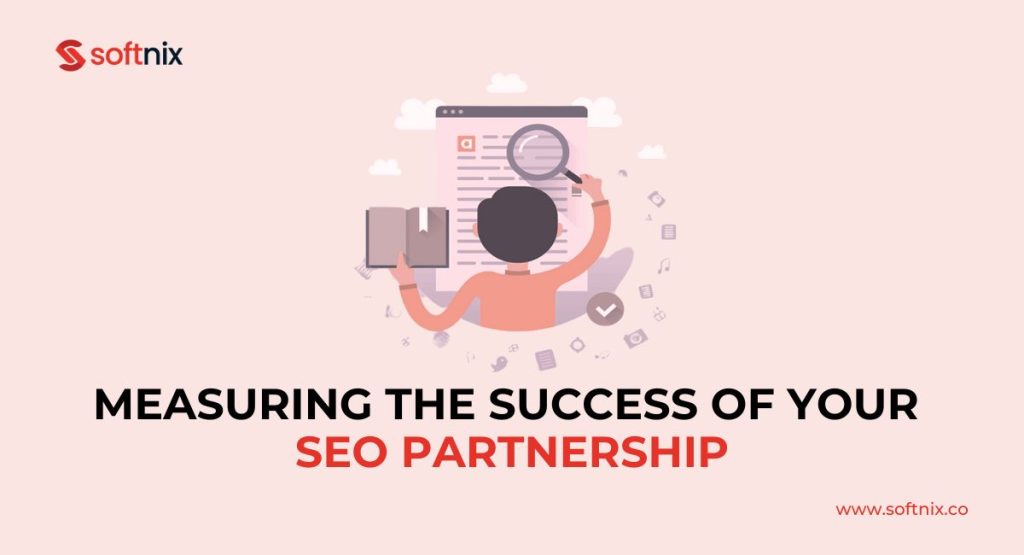
After collaborating on strategies and ensuring continuous improvement, it’s time to measure how well your SEO partnership is doing. Keep an eye on key performance indicators (KPIs) and use tracking tools to see what’s working. Regularly check your metrics to spot long-term trends and make tweaks as needed. This way, you’ll know you’re on the right track and can keep improving your results. By focusing on KPIs and performance, you’ll see what’s working and where you can do even better, leading to greater success.
1. Key Performance Indicators (KPIs)
Tracking key performance indicators (KPIs) is essential for measuring SEO success. These metrics help evaluate the effectiveness of your SEO efforts. Important KPIs to monitor include:
- Organic Traffic: The number of visitors coming from search engines.
- Bounce Rate: The percentage of visitors who leave after viewing only one page.
- Conversion Rate: The percentage of visitors who complete a desired action, like making a purchase.
Analytics experts recommend focusing on these KPIs to ensure clear metrics, informed evaluations, and measurable success, supported by real-world examples and data.
2. Tools for Tracking SEO Performance
Using the right tools to track SEO performance is crucial for gaining accurate insights. These tools help monitor your SEO efforts efficiently and effectively. Some of the best tools include:
- Google Analytics: Tracks a wide range of performance metrics.
- SEMrush: Provides in-depth keyword tracking and site audits.
- Ahrefs: Excellent for backlink analysis and competitive research.
Tool specialists recommend these options for their accuracy, efficiency, and effectiveness. User reviews and case studies support their reliability and usefulness in improving tracking and making data-driven decisions.
3. Analyzing Long-term Results and Adjustments
Regularly analyzing long-term SEO results and making necessary adjustments ensures ongoing success. Strategic planners emphasize the importance of these practices for continuous improvement. Key strategies include:
- Performance Reviews: Regularly evaluate the effectiveness of your SEO strategies.
- Adaptation: Adjust tactics based on data and results.
- Strategic Refinement: Continuously refine strategies for sustained success.
Methods for long-term analysis, supported by client feedback, highlight the value of regular evaluation and adaptation, ensuring sustained success and strategic refinement over time.
Ready to Hire a Trusted SEO Company for Your Business?
After reading all about the benefits of SEO for your business, I must say you are ready to take the next step. Ready to hire a trusted SEO company for your business? Softnix stands out in the SEO industry for its transparency and client-focused approach. Our team offers comprehensive services that drive real results.
Softnix has built a strong reputation with proven success stories and glowing testimonials from satisfied clients. Choose Softnix for professional SEO services that prioritize trust, clear communication, and lasting results. With Softnix, your business gets a reliable partner committed to your growth and success.
FAQs About the Importance of SEO for Business
1. Why should I hire an SEO agency for my business?
Hiring an SEO agency brings expertise, advanced tools, and up-to-date strategies that boost your online visibility, increase website traffic, and drive more sales. SEO agencies adapt quickly to algorithm changes, ensuring your online presence remains optimized and competitive.
2. What are the benefits of hiring an SEO agency?
Benefits include improved website performance, higher search engine rankings, increased organic traffic, better user experience, higher conversion rates, and long-term business growth. SEO agencies provide tailored strategies that align with your business goals for maximum impact.
3. How do SEO agencies improve website performance?
SEO experts enhance your website’s speed, usability, and navigation, leading to quicker load times, smoother navigation, and an improved user experience. These enhancements reduce bounce rates and increase visitor satisfaction and engagement.
4. How can an SEO agency increase my website’s search engine rankings?
SEO agencies use expert strategies like keyword optimization, quality backlink building, and technical SEO improvements. These techniques boost your website’s visibility in search engine results, attracting more visitors and potential customers.
5. What tools do SEO agencies use to improve SEO performance?
SEO agencies use advanced tools such as Google Analytics, SEMrush, and Ahrefs for detailed analytics, keyword tracking, site audits, and competitive research. These tools help create effective and data-driven SEO strategies.
6. How do SEO agencies stay updated with algorithm changes?
SEO agencies continuously monitor and adapt to algorithm updates from search engines like Google. They engage in ongoing education and adjust strategies promptly to maintain or improve your site’s ranking, minimizing the risk of penalties.
7. What is the typical timeline for seeing SEO results?
SEO results typically take time, with initial improvements visible within 1-3 months, noticeable boosts between 3-6 months, and significant results after 6-12 months. The timeline depends on competition, keyword difficulty, and site condition.
8. What should I expect during the onboarding process with an SEO agency?
Expect a detailed initial consultation and audit, custom strategy development, implementation in phases, and regular monitoring and reporting. These steps ensure a clear, organized start and effective SEO strategy execution.
9. How do SEO agencies measure success?
SEO agencies measure success using key performance indicators (KPIs) such as organic traffic, bounce rate, and conversion rate. They provide regular reports and performance reviews to track progress and adjust strategies as needed.
10. What are the cost structures of hiring an SEO agency?
Common pricing models include hourly rates, project-based fees, and monthly retainers. Each model has its benefits and drawbacks, offering flexibility, budget certainty, or consistent support, respectively. Choosing the right model depends on your business needs and budget.
11. What are the signs that my business needs SEO help?
Signs include declining website traffic, low search engine rankings, technical issues, ineffective content strategy, and stagnant or decreasing conversions. Addressing these problems with professional SEO help can significantly improve your online presence and performance.
12. What are the pros and cons of in-house SEO teams versus hiring an SEO agency?
In-house teams offer direct control, cost efficiency, and seamless integration but may face resource constraints and skill gaps. SEO agencies provide expertise, advanced tools, and scalability but can be costly and may have communication barriers. Choose based on your business needs and goals.

